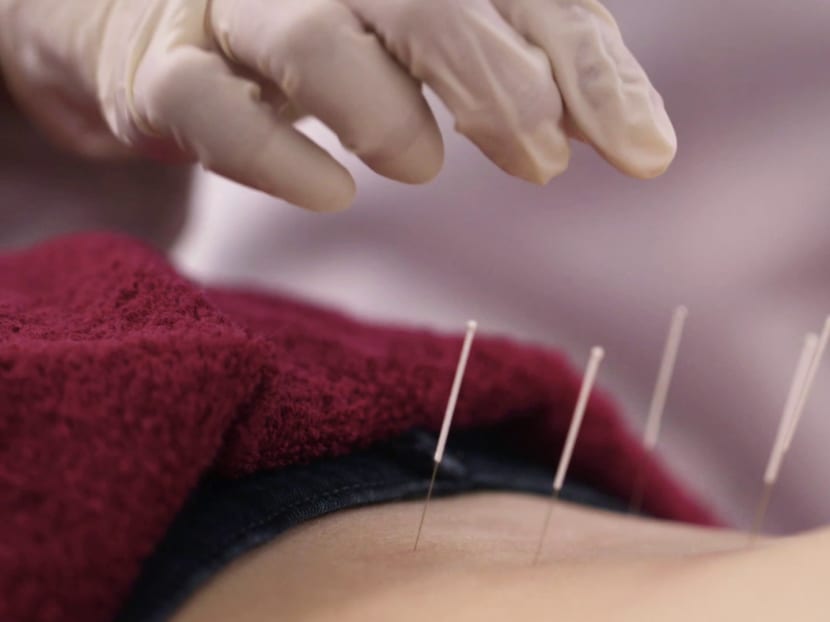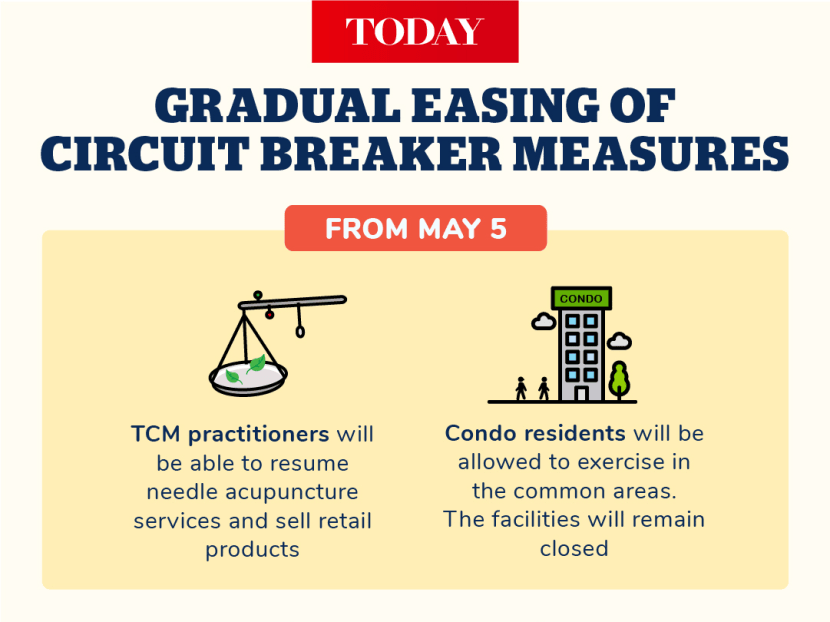Circuit breaker measures to be gradually eased from May 5, starting with TCM halls and ‘essential activities’ in condos
SINGAPORE — From Tuesday (May 5), circuit breaker measures will be gradually eased, paving the way for certain businesses to resume operations and small groups of students to return for face-to-face lessons, a multi-ministry task force dealing with the Covid-19 outbreak said on Saturday.

Traditional Chinese medicine (TCM) practitioners will be able to resume needle acupuncture services for cases in which this treatment is deemed essential and the TCM halls linked to them will be allowed to sell retail products.
SINGAPORE — From Tuesday (May 5), circuit breaker measures will be gradually eased, paving the way for certain businesses to resume operations and small groups of students to return for face-to-face lessons, a multi-ministry task force dealing with the Covid-19 outbreak said on Saturday.
The measures are being eased as community transmission has decreased significantly over the past month, but National Development Minister Lawrence Wong, who co-chairs the task force, said that Singaporeans must stay disciplined and vigilant.
“If there is no necessity to go out, stay at home — that must still be the mindset. Refrain from going out in groups, even if it’s with people from your own household,” he said.
“We are not out of the woods… and we don't want to risk a flare-up of the virus again.”
When asked about whether restrictions will be eased on places of worship, Mr Wong said it will probably be “quite some time” before this happens.
“We will want to refrain from any kind of close contact with people. So any premise, any event, any activity that entails large groups gathering in close proximity… those sorts of settings will have to wait for quite some time before they can resume. These will be the last we will allow.”
The situation remains “challenging”, said Health Minister Gan Kim Yong, who stressed the need for Singapore to remain vigilant and “not let our guard down”.
Mr Wong reiterated that the crisis is “far from over”, and Singaporeans should not take the easing of the circuit breaker measures as a signal that they can slacken on precautions and “life can go back to normal”.
Here is the broad timeline that Mr Wong laid out for the easing of circuit breaker measures in the coming days:
May 5:
-
Traditional Chinese Medicine (TCM) needle acupuncture will be allowed, for pain management only (excluding cupping, moxibustion, guasha and tuina manipulative therapies), if assessed by the TCM practitioner to be essential.
-
TCM halls with registered TCM practitioners will also be allowed to sell retail products. This is on top of the consultation and herbal dispensary services which they are already allowed to provide.
-
Residents living in strata-titled residential buildings may exercise within the common areas of these private residential developments such as footpaths, but must continue to practise safe distancing measures.
-
Mr Wong said the same rules that apply outside, in public areas, will apply inside condominium estates. This means that facilities such as playgrounds, club houses, barbecue pits, gyms and swimming pools will have to remain closed but essential activities such as walking and running will be allowed on the grounds of these estates. Residents will have to wear a mask while walking on the grounds and they cannot be out in groups. Enforcement officers will be entering the condos periodically to conduct spot checks, Mr Wong added.
-
Such activities had been prohibited because the concern was that in these enclosed spaces, enforcement would be hard and there may be crowds inside the estates. In fact, there was feedback about such concerns early in the circuit breaker period, Mr Wong noted. However, the task force has done a review and will allow essential activities to resume in these spaces, he said.
May 12:
-
Manufacturing and onsite preparation of all food, including cakes and confectionery, ice cream, cocoa, chocolate and chocolate products, and other snacks, will be allowed to resume.
-
Retail outlets of food, including cakes and confectionery, packaged snacks and desserts, will be allowed to reopen, for takeaway and delivery only.
-
Home-based food businesses may operate, but only for delivery or collection. Home-based private dining will not be allowed. Delivery and collection of food orders should be done in a safe and contactless manner, by appointment so that it can be spaced out, and there is no bunching of people.
-
Retail laundry services, barbers and hairdressers (for basic haircut services) and retail of pet supplies will also be allowed to resume.
-
The list of activities that will be allowed to operate, and relevant further information, will be updated at https://covid.gobusiness.gov.sg/essentialservices.
May 19:
-
Schools will bring back students from graduating cohorts in small groups for face-to-face consultations and lessons. Priority will be given to students requiring school facilities for coursework and practical sessions, and those who need additional support and remediation during the school vacation period.
-
Institutes of Higher Learning (IHLs), especially the Institute of Technical Education, will also bring back small groups of students on campus for critical consultations, projects or practicums.

SAFE DISTANCING REQUIREMENTS
As businesses resume operations and work premises are gradually reopened, they will have to implement strict safe distancing requirements.
This means that companies must continue to allow staff to work from home wherever possible, enforce safe distancing amongst their employees at the workplace, stagger working hours and break times and ensure no cross-deployment of staff across teams or worksites.
They should also require every employee to wear a mask at work and ensure that there are no gatherings amongst their staff. For example, staff should not be interacting at staff canteens, or going out in groups during lunch breaks.
To further support contact tracing efforts, SafeEntry must be deployed extensively across Singapore, especially at places with a higher risk of non-transient contact.
This would include workplaces, malls and supermarkets.
From 12 May 2020, all businesses and services that are in operation must come on board the SafeEntry system to log the check-in and check-out of employees and visitors.
At schools and IHLs, students’ return will be staggered throughout the day. They will practise safe distancing and safe management measures, such as keeping to separate groups within their cohort.
COULD SINGAPORE HAVE DONE BETTER?
During a media conference with the task force, a question was raised about the biggest lessons learnt from the crisis and what could have been done better.
Mr Wong said that Singapore is still in the “heat of battle”, but that when the crisis is over, there will be time to look back and reflect.
“I have no doubt that we will find many things which we could have done better, and many changes which should be made in order for us to be better prepared next time,” he said.
He added that the process of conducting a review is something the Government does after every crisis.
“In fact, the lessons from the Sars (virus outbreak in 2003) have been very helpful in enabling us to deal with Covid-19,” he said. “So likewise at the right time, we will certainly do a comprehensive review of this pandemic and our response, and seek to learn from it.”
Right now, the focus remains on “urgent priorities”, said Mr Wong.
And that is to bring the outbreak under control, take care of migrant workers and to work out how Singapore can exit from the circuit breaker restrictions and resume normal activities safely, he elaborated.
“The circuit breaker has helped to bring our numbers down and has bought us time, but this is a long fight,” he warned.
“The virus can flare up again anytime, so let us now stay focused on the mission, work together, and win this fight against the virus.”
.embed-container { position: relative; padding-bottom: 56.25%; height: 0; overflow: hidden; max-width: 100%; } .embed-container iframe, .embed-container object, .embed-container embed { position: absolute; top: 0; left: 0; width: 100%; height: 100%; }








